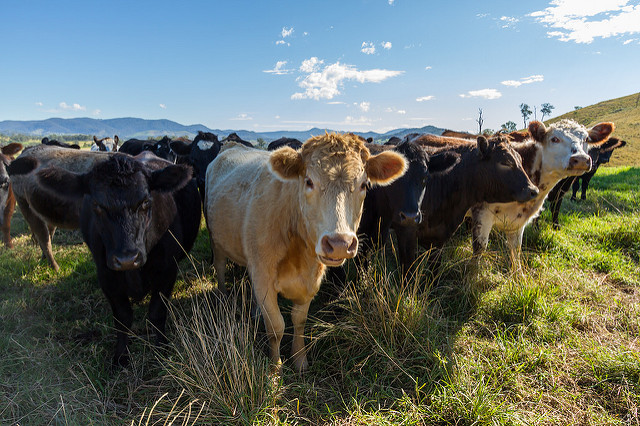If you thought your after-Thai food farts were the deadliest, think again.
An average cow can let out up to 132 gallons of methane a day. The gas rises from their excretory orifices like the steam dancing off drunken noodles, gathering and trapping the sun’s heat in the atmosphere and earning cattle the crown for Masters of Silent but Deadly.
Although methane is less prevalent in the atmosphere than carbon dioxide, it is, by unit, the most harmful of the greenhouse gases, contributing significantly to global warming and climate change.
Putrid cow farts are literally ripping into our atmosphere and creating the most foreboding Dutch Oven known to man.
Although several other human activities contribute to methane production (landfills, oil and gas refining and drilling, burning of fossil fuels), the Environmental Protection Agency posits that raising livestock for meat is the largest source of methane from human-related activities.
I imagine our cow fart scenario as a kind of B-class sci-fi film tucked away in the cobwebbed corners of Netflix:
The barren, cracked landscapes of the Earth are parched, all plant life having suffocated after years of begging to be let out from beneath the soggy blanket. The few surviving humans, who sport turtlenecks at all times despite the asphyxiating heat for ease of rolling up their shirt collars to protect from noxious gas, subsist off a diet of canned fruit and bean-o, which experienced a boom in production right before civilization’s final collapse.
“If only we had listened to the vegetarian activists,” they lament. “If only we had just hopped on the damn veggie burger wagon and decorated our pick-up trucks with ‘Eat Kale’ bumper stickers. Humanity could have survived.”
While vegetarianism could be one of any number of viable solutions to decreasing levels of methane gas emissions into the atmosphere, researchers in India are realistic about humanity’s willingness (or lack thereof) to collectively forego filet mignon.
At the Cow Research Institute in Mathura, scientists are creating a cattle feed that will reduce cow belches (since 95% of the methane from cattle actually comes from their oral flatulence). And nearby, breeding expert Dr. E.M. Muhammed has been toying with cattle DNA, breeding regular crossbred cows with miniature ones, which produce one-seventh the amount of manure and one-tenth the amount of methane gas.
India may be ranked the lowest consumer of meat in the world, according to the Food and Agriculture Organization of the United Nations, but they have the largest cattle inventory (followed by Brazil and China, with the United States coming in fourth). Worse, India is expected to double its greenhouse gas-emitting coal production by 2019, so finding a way to limit methane gas output is even more detrimental.
As certain world leaders continue to deny climate change, even going so far as to sabotage potential global climate deals at the United Nations Climate Change Conference last year in Paris, it is more relevant than ever that scientists like Dr. Muhammed are working toward solutions for us to evolve within the framework we already live in.
Otherwise, we could just keep politely excusing our livestock’s bodily functions ‘til the cows come home—and we are all Dutch Ovened to death.
Author: Felicia Bonanno
Image: Marc Dalmulder/Flickr
Editor: Emily Bartran







Read 0 comments and reply